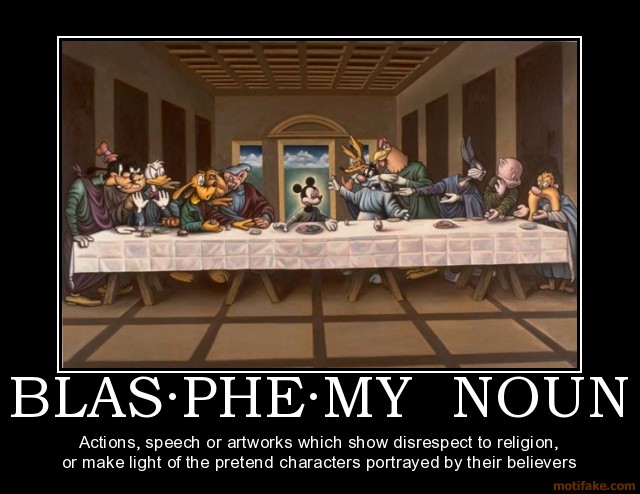blas·phe·my (bl s s f f -m -m ) )
n. pl. blas·phe·mies
1.
a. A contemptuous or profane act, utterance, or writing concerning God or a sacred entity.
b. The act of claiming for oneself the attributes and rights of God.
2. An irreverent or impious act, attitude, or utterance in regard to something considered inviolable or sacrosanct.
|
This is a blog about a very emotive subject. It is fraught with difficulties, of which more in a moment. But first a declaration of interest: speaking as a secular humanist I do not belong to any organised religion, nor do I have any interest in them, other than as a sociological phenomenon. But then as an outsider I would argue I am very well placed to discuss this subject without bias or favour!
Problem 1: to start a discussion on blasphemy, you need first to understand what on earth it is that you are discussing. Every interested party in the debate will have different lenses through which to view the concept, so it is hardly surprising if a debate turned out to be a series of non-sequiteurs. Yes, we have a dictionary definition (above), but the Biblical and Islamic definitions are totally different, it would seem. Moreover, the legal definition is different again, bound in case law and precedents, and also recent legislation. For these purposes, the dictionary definition seems very appropriate and will be used as the basis for a simple analysis.
Problem 2: since we are talking about religious communities and individuals here, all will take offence at any perceived slur against their religion, deities, artefacts and/or practices. Some seem to take great delight in doing so. Others are probably much less sensitive, but you could not assume that what offends one person will necessarily offend another. My assertion is that we are all different, though one issue with some organised religions is that they prefer people to follow like sheep what is deemed the party line – which could in extreme cases imply that anyone disagreeing with a given biblical pronouncement was inherently being blasphemous or, worse, heretical. You only have to consider the doctrine of papal infallibility and the horrors of the Spanish inquisition to realise that what was once blasphemous and punishable by death and/or excommunication is but a few steps along the road (this springs to mind!) Again, I shall the dictionary definition as a starting point.
Formalities over, this effectively translates as a superannuated version of libel and slander against supernatural deities. From my standpoint (will clearly win no friends within religious communities), since no supernatural deities exist and cannot therefore take direct action against any rude retort or mocking gesture, when a form of behaviour is deemed blasphemous, it is the followers of a religion that have taken offence. Libel by proxy, you might say, along with a catch-all legal protection for any perceived slur against your belief set.
Yet, in its crudest sense we might all be said to have blasphemed every day. Even atheists mutter “God!” to themselves – we might argue that the word is a meaningless oath, yet the more sensitive believer would say that was “taking the Lord’s name in vain”. Maybe it’s all about context, since the medium you use and the message you employ may well have anti-religious tones – which we would normally attribute to freedom of speech. Jerry Springer the Opera, attracted much opprobrium for its themes and profanity, which for the TV showing attracted 47,000 complaints to the BBC…before the programme was even shown. How many related to the language and how many for it be feeling of religious persecution is not given, though freedom of expression won out.
Here’s a key question: What does it matter if you do? Is your deity so sensitive they can’t stand their name being spoken as a minor expletive? Nobody is hurt and nothing changes. Why should that evoke any form of response, let alone a legal challenge or violence? Is that justifiable?
If blasphemy is enshrined in law, why not also a law specifically to protect the hurt feelings of atheists, who are pilloried constantly by religious nutcases? Obviously not, but then neither is blasphemy a sensible remedy. Even governments have questioned whether this “anachronistic” law should stay on the statute book, one specifically for religious believers. In short, good sense and tolerance should apply. You can challenge people and their beliefs in a range of ways, and insult or belittle them, but their best response is to reply in kind, not hide behind the law. That way suggests to me cowardice and fear of open debate.









